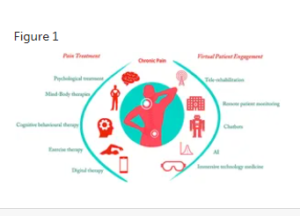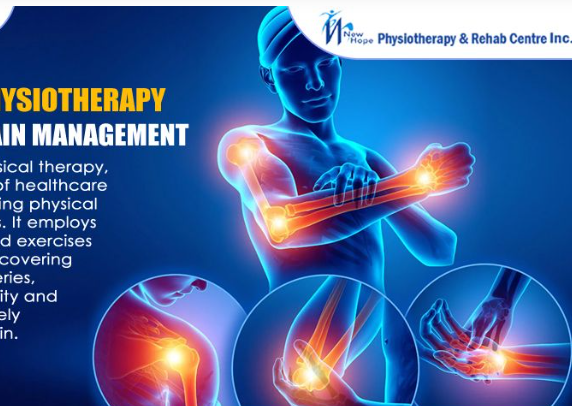Effective Approaches to Chronic Pain Management
Chronic pain is one of the most common long-lasting diseases among people. Despite the fact that millions of people live with it every day, most people do not manage to fight chronic pain for many years, and their quality of life declines. That is why proper chronic pain management becomes very important, as it can help improve quality of life and return people to normal functioning. In this rereview, there will be a discussion of the different methods that can be used to manage chronic pain including medications, alternative therapies, and self-care and psychosocial strategies. Being armed with this knowledge, patients can develop a more effective and reliable plan for pain management.

What are Some of the Considerations when Managing Chronic Pain
The management of chronic and persistent pain is multidimensional and requires a number of steps. Below are some of the considerations:
- Personalized Treatment Strategies: Chronic pain management requires tailored treatment strategies. This is primarily due to the fact that different people will respond to different treatments.
- Whole-person treatment: The use of medication and physical therapy along with psychological treatment and lifestyle changes to address the chronic pain in a patient in a more effective manner.
- Empowerment of the Patients: Learning about chronic pain and treatment options available makes the patients feel more empowered. This is essential as self-educated patients tend to take an active role in their treatment plans.
- Collaboration with Healthcare Providers – Pain management is an ongoing process that involves regular check-up as well as consultation with professional healthcare providers to ensure that the pain management plan is and can be adjusted as necessary.
- Focus on Long Term Management – Chronic pain is for life due to the prolonged nature of the disease. Therefore, the focus is on the management of the symptoms in the long term as opposed to seeking a cure.
Specialty of How to Manage Chronic Pain Effectively
Effectively managing chronic pain is a multidisciplinary issue which requires skills from different subspecialties. Among the common specialties involved include:
- Pain Management Specialists: The healthcare professionals who have an extensive scope of practice and focus on diagnosis and treatment of pain disorders. They practice the use of more advanced, nerve blocks and other such devices which are implantable.
- Physical Therapists: Physical therapists help initiate muscle stregth and flexibility by developing exercise programs to meet patients’ needs utilizing movement and rehabilitation as their expertise.
- Psychologists and Psychiatrists: Patients suffering from chronic pain oftentimes deal with the emotional components of chronic pain and for this reason, mental health professionals are also important. Pain, anxiety and depression associated with pain has been treated by CBT which is an abbreviation of Cognitive Behavioral Therapy.
- Nutritionists: Nutritionists understand that diet has an impact in most chronic diseases. They integrate their skills and nutritional advice to chronic pain sufferers to promote good health and lower inflammation.
- Alternative Medicine Practitioners: Other specialists such as those who practice acupuncture, dan massage therapy, cupping therapy and chiropractors practice pain alleviating techniques.
Applications of How to Manage Chronic Pain Chronically in an Effective Manner.
There are many different ways on how chronic pain is managed, and these methods can be transferred from one context to another. The following points can be noted:
Management in Daily Life: There are practices such as mindfulness, physical activity or nutrition, which help many individuals to reduce their pain level in day-to-day life and do the things which they are passionate about.
Adjustment in Workplace: Introduction of ergonomic practices and inclusion of short breaks during working hours can minimize the chances of pain flare-ups, enabling people to work.
Through Sports & Fitness: People with chronic pain diseases who are active in sports or fitness can maintain their level of activity with the help of specialized exercise programs prescribed for their conditions.
Through Community Support: Meeting with people who have similar experiences or using community help can offer individuals the opportunity to share their experiences and ways to address the issues with each other.
Self-Management of Healthcare: Individuals may track their pain and the treated disease through pain monitors and other tools and utilize that in interactions with healthcare specialists.
How to Manage Chronic Pain Effective The Main Theme Of The Article
Practically every study dealing with the issue of chronic pain has at its core to support the principle of self management. It advocates that the painful suffering is something that an individual can conquer, not something that overcomes them. By exploring the nature of their pain, considering different options for pain management, and working with doctors, patients can improve their health in a far better manner. The theme further stresses the need for diversity in addressing chronic pain; what may work for one patient might not necessarily be effective on another. This makes it possible to incorporate change and improvement in treatments of pain.
Chronic Pain Management Techniques: Benefits and Drawbacks
Pros Cons
- Unique and individualized treatment methods Lengthy trial and error may be needed
- Improved care with a multi-faceted approach localized medicine may be present which is less effective
- Allows patients to actively participate in their care difficult to implement and manage
- Team based approach …which is distressing as patients are advised by different professionals
- Longer focus. Quality of life is taken seriously Emotional impact and patient’s frustration with chronic pain
Conclusion: Suggestions for the management of Chronic Pain
Effective management of chronic pain is a complex and sometimes difficult undertaking that requires an individualized approach, cooperation from various healthcare professionals, and an ability to manage one’s own illness. It is noteworthy that with appropriate medical, alternative and lifestyle interventions, and even psychosocial support, it is possible to make huge strides toward reducing pain and improving current functioning. There may be challenges in this process, but with the right tools and strategies, many effective approaches can be found, making it possible to live a quality life with chronic pain.
How Would You Effectively Manage Chronic Pain? Questions And Answers
What are some common causes of chronic pain? Give examples.
Chronic pain can be the result of multiple factors, such as an injury, surgical procedure, disease such as arthritis, rheumatoid arthritis or fibromyalgia, infections diseases or nerve damage.
Can making lifestyle changes help with chronic pain?
Indeed, the incorporation of lifestyle changes such as exercise, proper nutrition, and some stress management strategies can have a profound effect on the level of chronic pain.
Are there alternatives for chronic pain management that do not include medication?
Several other approaches like physical therapy, acupuncture, and mindfulness practices are among the many non-medicational approaches that do work in chronic pain management.
What role does psychological therapy play in chronic pain management?
Psychological therapies, most especially cognitive behavioral therapy (CBT) can offer patients with pain the opportunity to modify the way they think about pain and how they react towards it and in extension emotional stress with chronic pain becomes less.
Are there dangers of using solely opioids in dealing with pain issues?
If opioids are useful to some of the patients, enough caution needs to be exercised as they can be addictive. Such medications should only be used in combination with other types of treatment in a multi-modal approach to pain management.
